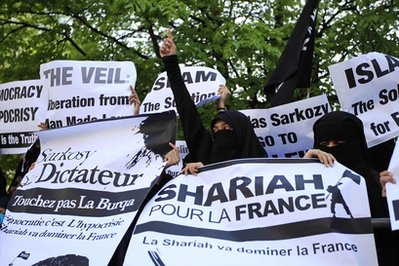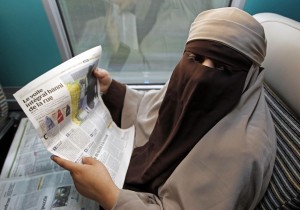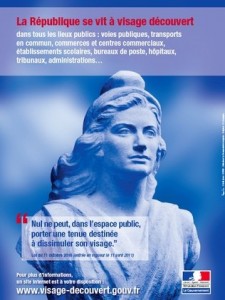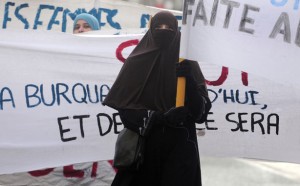France: Burqa Ban Goes Into Effect
France’s much-debated “burqa ban” entered into force on April 11. The new law, which prohibits the wearing of Islamic body-covering burqas and face-covering niqabs in all public spaces in France, comes amid rising frustration that the country’s estimated 6.5 million Muslims are not integrating into French society.
France: Burqa Ban Goes into Effect
Soeren Kern | Gatestone Institute | April 14, 2011
France’s much-debated “burqa ban” entered into force on April 11. The new law, which prohibits the wearing of Islamic body-covering burqas and face-covering niqabs in all public spaces in France, comes amid rising frustration that the country’s estimated 6.5 million Muslims are not integrating into French society.
With certain exceptions, anyone in France covering their face on the street and in parks, on public transportation, in public institutions such as train stations and town halls, and in shops, restaurants and movie theaters, will be subject to a fine of €150 ($215). Exceptions to the ban include the covering of one’s face with a motorcycle helmet, sunglasses, a bandage, a welding mask, a fencing mask or a fancy dress mask.
More severe penalties are in store for those found guilty of forcing others to cover their faces by means of “threats, violence and constraint, abuse of authority or power for reason of their gender.” Clearly aimed at Muslim fathers, husbands and/or religious leaders, anyone found guilty of forcing a woman to wear an Islamic veil against her will is subject to a fine of €30,000 ($43,000) and one year in jail, or €60,000 ($86,000) and up to two years in jail if the case involves a minor.
The ban does not apply in private homes, hotel rooms and office buildings, except for elevators, conference rooms and lobbies and/or other spaces open to the public. The law also defines the inside of an automobile as a private space exempt from the measure.
In a circular sent to prefects and police chiefs that explains how the new measure will be implemented, French Interior Minister Claude Guéant ordered police to enforce the law in a “determined and vigilant” manner, but to do so by using as much tact as possible, namely by trying to persuade rather than to coerce women to show their face for identity checks.
Guéant also stressed that the law is not to be applied near mosques, and that police do not have the right to forcibly remove a woman’s veil. Instead, offenders should be warned that they can be taken to a police station to have their identities verified. In addition to imposing fines, police can also order veil-wearers to attend “citizenship” classes.
Although critics of the burqa ban — which was approved overwhelmingly by the French Parliament in October 2010 — say it stigmatizes Islam, the French government insists the law is designed to guarantee gender equality and reaffirm the secular values of the French state. In a separate circular issued in March, French Prime Minister François Fillon said he wanted to “solemnly reaffirm the values of the republic,” and argued that “concealing the face … places the people involved in a position of exclusion and inferiority incompatible with the principles of liberty, equality and human dignity affirmed by the French Republic.”
French President Nicolas Sarkozy has been far more outspoken in his support for the ban. He says the burqa is “a new form of enslavement that will not be welcome in the French Republic.” Jacques Myard, a conservative member of parliament who supports the ban, says the burqa is a “shock” to French culture. “The face is a dignity of a person. The face is your passport. So when you refuse me to see you, I am a victim,” he says.
Polls show that French citizens back the burqa ban by a margin of more than four to one. According to a survey conducted by the Washington, DC-based Pew Global Attitudes Project, 82 percent of French voters are in favour of the ban, while only 17 percent are not.
The new law comes into effect at a time when French voters are growing increasingly worried that the Muslim minority is building a parallel society in France. Picking up on the unease over the lack of Muslim integration, Sarkozy on February 10 denounced multiculturalism as a failure and said Muslims must assimilate if they want to be welcomed in France.
Then, on April 5, Sarkozy’s center-right Union for a Popular Movement (UMP) party held a controversial debate on the compatibility of Islam with the rules of the secular French Republic. The three-hour round-table discussion, the title of which was altered to remove any reference to Islam, resulting in the anodyne “Secularism: To Live Better Together,” was held at the upscale hotel Pullman Paris Montparnasse in the presence of some 500 religious leaders, legislators and journalists.
Organized by UMP leader Jean-François Copé, attendees discussed 26 ideas aimed at preserving France’s secular character, which was enshrined in a 1905 law separating church and state. Participants discussed modern-day quandaries about issues such as halal food being served in schools and Muslims praying in the street when mosques are too crowded, as well as a proposal to enact a new law that would prohibit citizens from rejecting a public service employee because of their sex or religion. The idea, Copé said, was to prevent cases where “women, often under pressure from their husbands, refuse to be treated by a male doctor.”
Other proposals discussed at the event include: banning the wearing of religious symbols such as Muslim headscarves or prominent Christian crosses by day care personnel; preventing Muslim mothers from wearing headscarves when accompanying children on school field trips; and preventing parents from withdrawing their children from mandatory subjects including physical education and biology.
Facing accusations from critics that the debate amounted to veiled Muslim-bashing, one of Copé’s most senior UMP colleagues, Prime Minister Fillon, declined to take part in the event, warning that it risked “stigmatizing Muslims.” Copé responded by saying the debate was “controversial but necessary” and accusing critics of being “in denial.”
In any case, the tide of public opinion seems to be with Copé and those worried about the effects of runaway Muslim immigration. Recent polls show that up to two-thirds of French voters believe that “multiculturalism” and the integration of Muslims into society have failed. The twin issues of Islam and immigration have resulted in a surge of popularity for the far-right National Front party and its charismatic new leader, Marine Le Pen, who recently compared crowds of Muslims praying in the streets outside mosques to the Nazi occupation of France.
According to a recent survey by Ifop for the France-Soir newspaper, nearly 40 percent of French voters agree with Len Pen’s views that Muslim prayer in the streets resembles an occupation. Moreover, a new opinion poll published by Le Parisien newspaper on March 8 shows that voters view Le Pen, who has criss-crossed the country arguing that France has been invaded by Muslims and betrayed by its elite, as the candidate best suited to fix the problem of Muslim immigration.
Sarkozy, whose popularity is at record lows just twelve months before the first round of the 2012 presidential election, has been spooked by Le Pen’s advance in the opinion polls, which show her ahead of both Sarkozy and Socialist leader Martine Aubry. Sarkozy now seems determined not to allow Le Pen to monopolize the issue of Islam in France. He recently called Muslim prayers in the street “unacceptable” and said that the street cannot be allowed to become “an extension of the mosque.”
He also fired Abderrahmane Dahmane, a Frenchman of Algerian descent he hired in January to promote “diversity” after the appointee openly attacked the president’s views on Islam in France. Dahmane now says Muslims in France should wear a five-pointed green star to protest against what he called “the fascist climate that evokes the sombre history of the Occupation in France, which sent thousands of Jews by train to the death camps.”
Some French commentators have pointed out the twisted irony of Muslims equating themselves to the Jews in the Holocaust, considering that Muslims for centuries imposed distinctive clothing on Jews and other non-Muslims and served as the inspiration for the yellow Star of David that wartime Jews were forced to wear by the Nazis.
The green star idea is “totally grotesque,” says Richard Prasquier, head of the Representative Council of Jewish Institutions in France (CRIF), a Jewish umbrella group. Prasquier, who supported the April 5 debate as a valid response to the concerns of French voters, told Agence France-Presse: “It is unfortunately part of a wider movement that mixes everything up and makes everything equate to the Holocaust.”
Soeren Kern is Senior Fellow for European Politics at the Madrid-based Grupo de Estudios Estratégicos / Strategic Studies Group. Follow him on Facebook and on Twitter.
Link to Original Article: http://www.gatestoneinstitute.org/2037/france-burqa-ban







